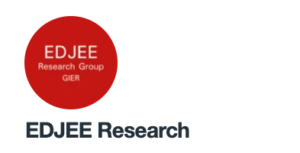EDJEE is a collaborative project comprising a number of researchers within GIER, co-facilitated by Dr Sue Whatman and Professor Parlo Singh. EDJEE researches the impacts of socio-economic circumstances, mental and emotional upheaval and discrimination on the grounds of race, ethnicity, migration status, gender and age on students’ experiences of education.
The group won the 2021 AEL Team Research Excellence Award for innovative HDR student and researcher collaborations, including the Pedagogic Codes, Pedagogic Rights (PCPR) Lab. EDJEE has a video channel, featuring interviews with a range of fascinating sociologists and researchers from different backgrounds, career stages and walks of life.
 The idea of EDJEE is to bring researchers together in one unique and specific site and use a common theoretical framework to explain that phenomena to other people and how it applies in different scenarios. In doing so, the aim is to make dense theoretical work more accessible.
The idea of EDJEE is to bring researchers together in one unique and specific site and use a common theoretical framework to explain that phenomena to other people and how it applies in different scenarios. In doing so, the aim is to make dense theoretical work more accessible.
Dr Whatman says:
“The aim is to generate new knowledge around disrupting educational disadvantage in order to restore justice and equality in situations that have been underscored by factors related to discrimination, gender, race or class.”
The common theme woven throughout EDJEE Research is disruption, with many using Basil Bernstein as a key theorist in conducting their sociological research. Basil Bernstein’s work became recognised in the 1970s when he wrote “Class, Codes and Control” and the classic paper in this book is called the Classification and Framing of Knowledge. Professor Parlo Singh talks more about Bernstein’s work and the meaning of it in this video.
Bernstein was known for providing complex diagrams that helped to understand the specialisation of educational communication. He also looked at the evolution of educational systems over time. His work acknowledges that the classroom is part of a bigger system, including regional, state, nation state and global systems of influence.
Dr Whatman says it is a robust model for showing how education policy gets interpreted, recreated, enacted, all the way down to the teacher and student level. It is a model that encompasses and acknowledges how processes change over time.
She says:
“These videos aim to help people understand a complex theoretical construct, and to see how people are doing great work in disrupting social inequality. They serve our remit in EDJEE which is asking questions and investigating ways to address social inequality.”
GIER will continue to feature the fascinating array of interviews and interviewees from EDJEE. Subscribe to them here.


